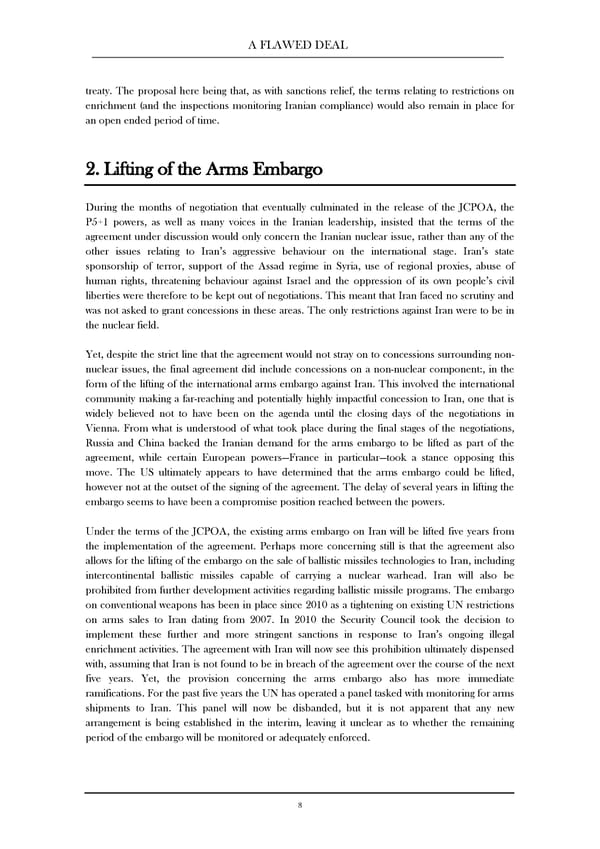! A FLAWED DEAL treaty. The proposal here being that, as with sanctions relief, the terms relating to restrictions on enrichment (and the inspections monitoring Iranian compliance) would also remain in place for an open ended period of time. 2. Lifting of the Arms Embargo ! During the months of negotiation that eventually culminated in the release of the JCPOA, the P5+1 powers, as well as many voices in the Iranian leadership, insisted that the terms of the agreement under discussion would only concern the Iranian nuclear issue, rather than any of the other issues relating to Iran’s aggressive behaviour on the international stage. Iran’s state sponsorship of terror, support of the Assad regime in Syria, use of regional proxies, abuse of human rights, threatening behaviour against Israel and the oppression of its own people’s civil liberties were therefore to be kept out of negotiations. This meant that Iran faced no scrutiny and was not asked to grant concessions in these areas. The only restrictions against Iran were to be in the nuclear field. Yet, despite the strict line that the agreement would not stray on to concessions surrounding non- nuclear issues, the final agreement did include concessions on a non-nuclear component:, in the form of the lifting of the international arms embargo against Iran. This involved the international community making a far-reaching and potentially highly impactful concession to Iran, one that is widely believed not to have been on the agenda until the closing days of the negotiations in Vienna. From what is understood of what took place during the final stages of the negotiations, Russia and China backed the Iranian demand for the arms embargo to be lifted as part of the agreement, while certain European powers—France in particular—took a stance opposing this move. The US ultimately appears to have determined that the arms embargo could be lifted, however not at the outset of the signing of the agreement. The delay of several years in lifting the embargo seems to have been a compromise position reached between the powers. Under the terms of the JCPOA, the existing arms embargo on Iran will be lifted five years from the implementation of the agreement. Perhaps more concerning still is that the agreement also allows for the lifting of the embargo on the sale of ballistic missiles technologies to Iran, including intercontinental ballistic missiles capable of carrying a nuclear warhead. Iran will also be prohibited from further development activities regarding ballistic missile programs. The embargo on conventional weapons has been in place since 2010 as a tightening on existing UN restrictions on arms sales to Iran dating from 2007. In 2010 the Security Council took the decision to implement these further and more stringent sanctions in response to Iran’s ongoing illegal enrichment activities. The agreement with Iran will now see this prohibition ultimately dispensed with, assuming that Iran is not found to be in breach of the agreement over the course of the next five years. Yet, the provision concerning the arms embargo also has more immediate ramifications. For the past five years the UN has operated a panel tasked with monitoring for arms shipments to Iran. This panel will now be disbanded, but it is not apparent that any new arrangement is being established in the interim, leaving it unclear as to whether the remaining period of the embargo will be monitored or adequately enforced. 8 ! !
 A Flawed Deal Page 10 Page 12
A Flawed Deal Page 10 Page 12